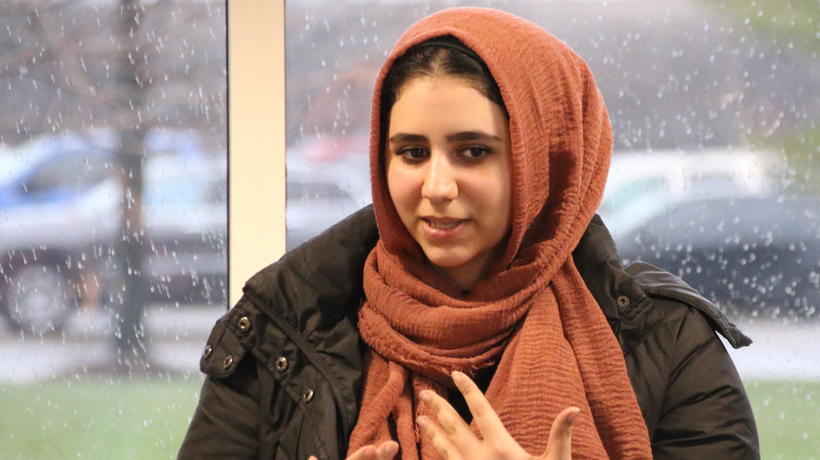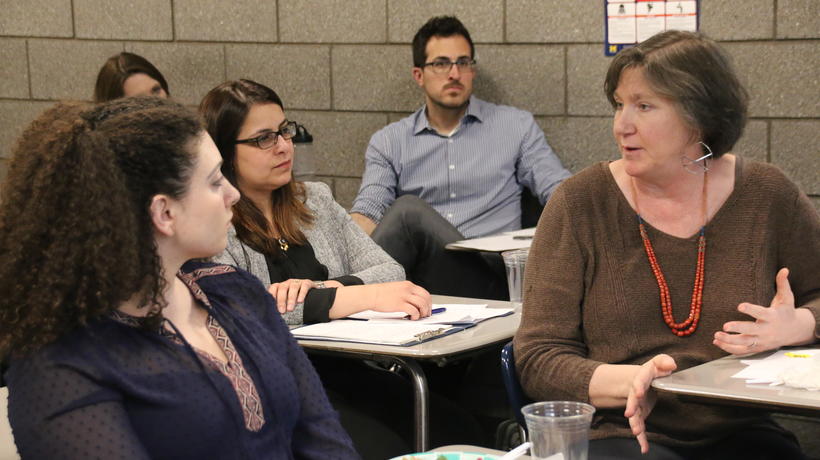
Since he was a child, Ahmad Alkaabi had the same barber cut his hair. The barber, Alaa Ridha, would ask Alkaabi about his day, school and family.
But it was through a College of Arts, Sciences, and Letters course that Alkaabi took the time to ask Ridha about his life, his Iraqi-American experience.
“I’ve known him for so long, but it was the first time I sat down and had a conversation with him about his life—like why did he come to the United States, when and how,” said Alkaabi, a sociology major. “This class gave me the opportunity to really know him.”
The class, Arab American Studies 315: Public Cultural Work in Arab Detroit, encourages students to explore the culture around them by asking people to share their stories. Nearly 20 students spent the winter semester reading Iraqi history and writings, and—most importantly—interviewing Iraqi-Americans, like Ridha, and gathering their stories as primary source research.
The course, led by History Professor Pam Pennock and History Associate Professor Sally Howell, explores the many ways in which Dearborn and Detroit have been shaped by their Arab and Muslim communities—and specifically Iraqi community—and how the area’s Arabs and Muslims are equally a product of the social, economic and cultural history of metropolitan Detroit.
“We want to introduce the value and excitement of doing public cultural work and the importance of doing it in your own community. We are fortunate to have such a rich history and culture right here with our Arab and Muslim communities,” said Howell, who notes that both Arab and Muslim communities have been in the area for more than 100 years and that their histories are deeply embedded within those of Detroit and the auto industry since the early 1900s.
Focusing on the Iraqi experience was a collaborative decision between the class and the educators.

“Students in the class felt like the story of the Iraqi migration here in Detroit is not really being told,” Howell said. “And when it is being told, it is being told from an outsider’s perspective that emphasizes the miskeen nature of the refugees instead of talking about their contributions and really diving into their experiences. So the class wanted to do their part to change that.”
The course was funded through a community-supported challenge grant from the National Endowment for the Humanities. The grant was awarded to University of Michigan-Dearborn’s Center for Arab American Studies, where Howell is the director.
Howell said the course’s objectives remained the same throughout the term, but the project’s scope evolved. Students first presented their oral history projects to each other and then to an audience that included alumni, community members and Iraqi-Americans—including those who took part in the project—in attendance.
Howell and Pennock evaluated the presented research, along with Arab American National Museum Research and Content Manager and University of Michigan faculty Matthew Jaber Stiffler, and Lamees Al Ethari, a faculty member at University of Waterloo, Ontario, Canada, whose research area is Iraqi migration.

“Mass media stories are great and useful, but tend to miss the everyday. The story of community is in the details and these students are going out to do oral histories to get the details so future generations will have them,” Stiffler said. “The presentations were fantastic and I’m looking forward to seeing the exhibit.”
Howell said the students were so moved by the stories they heard that they wanted to make the research available to a larger audience.
“They saw these common themes—such as shifting cultural identity, wanting to provide a better life for their children and reinventing their career paths for economic success in America—and wanted to create an exhibit so others could also have the chance to hear these stories and see these themes,” she said.
A team of students from the course will continue to develop the exhibit over the summer. The final exhibit will be showcased this fall in the CASL Building and at the Destination Detroit conference Sept. 27-29 at the University of Michigan Detroit Center.
Freshman Nour Ali, who will work on finishing the exhibit over the summer by collecting additional recorded oral histories and taking photographs of the Iraqi-Americans involved, said taking this course has strengthened her pride in being Iraqi-American and has helped her better understand her family’s story. Ali’s father was exiled from the country after Hussein came to power.
“Talking with other Iraqi-Americans and hearing their stories, it made me realize that my family wasn’t alone in their experience; I wasn’t alone,” said Ali, who is majoring in international studies and, after the course, decided to minor in Arab American studies. “Growing up, I wouldn’t tell people that I was from Iraq; I was worried that people would see me negatively. But now I am proud of where my family came from, and I respect everything they have done to give us a better life. I want the Iraqi story to be heard.”





